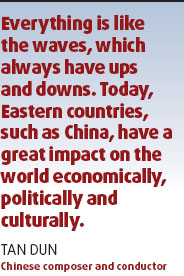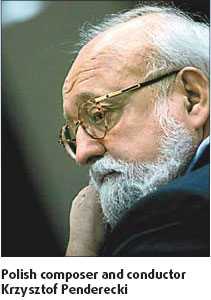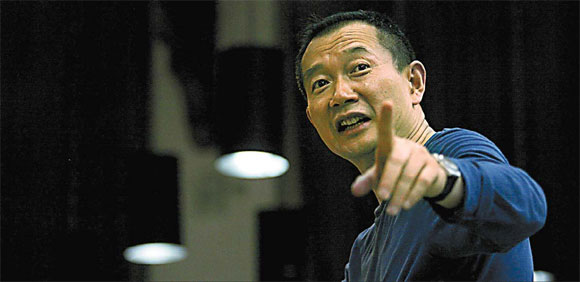The world's a stage
|
Chinese composer and conductor Tan Dun will share the stage with Krzysztof Penderecki tonight at Poly Theater as part of the Beijing Music Festival. Photos by Jiang Dong |
Tonight, at the 10th anniversary of the Beijing Music Festival (BMF), 74-year-old Polish composer and conductor Krzysztof Penderecki will perform his Symphony No 8 Songs of Transience. Although not a new work, Penderecki says he has rearranged it and added something inspired by nature for the concert at Poly Theater.
Premiered in Luxemburg in 2005, it is a large-scale collection of German poems by Goethe and others on the theme of man's destruction of nature.
But just as important as what the symphony means is what it represents: A dialogue between the East and West. Of course, Penderecki represents the West, while Yu Long, the artistic director of BMF, is the designer. Sharing the stage with Panderecki is the famed Chinese composer and conductor Tan Dun who brings Secret Land for 12 Cellos and Orchestra. Tan also rearranged the piece specially for the 10th anniversary of the BMF and wishes to rename Secret Land as The Four Silk Roads of Marco Polo.
"I created the piece in 2004, when I was commissioned by the Berlin Philharmonic. As time went by, I found that my understanding of Chinese culture had evolved. So, when Yu approached me, I said I wanted to rewrite the Secret Land, which was inspired by the Silk Road," Tan says.
"I think it is a perfect choice for a concert focusing on East-West dialogue."
Originally, the 30-minute piece was a philosophical reflection on humanity.

"It deals with the phenomenon of Silk Road cultures, a search that is still so haunting. From my personal point of view, I see the Silk Road as very open and inspirational, just like a silkworm spinning its cocoon no matter how long you pull the silk, the thread never breaks. That invisible thread always exists," Tan says.
"This piece is a soulful search of cultural harmonies that are organically related, although these individual elements all grow in different forms and directions. This work is about the many secrets that exist among cultures."
The revised piece Beijing audiences will hear is composed of four movements: From Venice, Market Crowded With Multi-ethnic People Behind Masks, Lake in Desert and To the Forbidden City.
"For this piece, my inspirations came from those sounds made on haunting, plucked instruments, such as the sitar and pipa. From ancient times, philosophers believed that any sound that exists has a life, a starting point, a duration and an end. A sound is life, and life is sound. I transpose and enlarge these inspirations from plucking sounds to orchestral colors and gestures," the composer says.
Tan interprets the last movement as the end of Marco Polo's journey - his arrival at the Forbidden City. In this part, he was inspired by the Mongolian long tune.
"I imagine Marco Polo riding his horse on his long journeys. What is horsing around? Marco Polo certainly was horsing around. The Mongolian long tune still symbolizes the special characteristics of nomadic life. Actually, everybody who lives life fully is horsing around, but no one knows that horsing around also makes a graceful map for our lives," Tan says.
Tan and Penderecki first met in Tokyo four years ago. The Swiss conductor Charles Dutoit introduced them to each other when he conducted two back-to-back concerts, one featuring Penderecki's and the other of Tan's music.
"But I had actually known master Penderecki for many years. I learned many of his scores when I was a student. At that time, Chinese music students all learned from the Western musicians and were eager to study in the United States or Europe. But everything is like the waves, which always have ups and downs. Today, Eastern countries, such as China, have a great impact on the world economically, politically and culturally," says Tan.

Penderecki believes that more and more Western musicians are showing interest in Chinese music and culture. For example, his Symphony No 8 actually uses the pentatonic scale, which is the tradition in Chinese music.
Rooted in Chinese tradition, Tan keeps exploring new ways to create sounds and music, such as his organic music projects. These are works that incorporate elements from the natural world, such as the Water Concerto for Water Percussion and Orchestra, commissioned and premiered by the New York Philharmonic with Kurt Masur, and Paper Concerto for Paper Instruments and Orchestra for the Los Angeles Philharmonic and Esa-Pekka Salonen for the opening of the Walt Disney Concert Hall in October 2003.
Last Saturday night at the Shanghai Grand Theater, during a concert entitled Patrimony, Tan Dun conducted the Shanghai Symphony Orchestra to perform the Water Concerto and Paper Concert.
Commissioned by Vienna Philharmonic Orchestra, he is writing the third piece of the organic music series, the Porcelain Concerto, in which he will create music with old Chinese pottery and porcelain.
He says that he is trying to make the piece a Chinese version of Song of the Earth and hopes to have it performed alongside Mahler's work on the same stage. That would definitely be another interesting cultural dialogue between East and West.
(China Daily 10/24/2007 page18)















